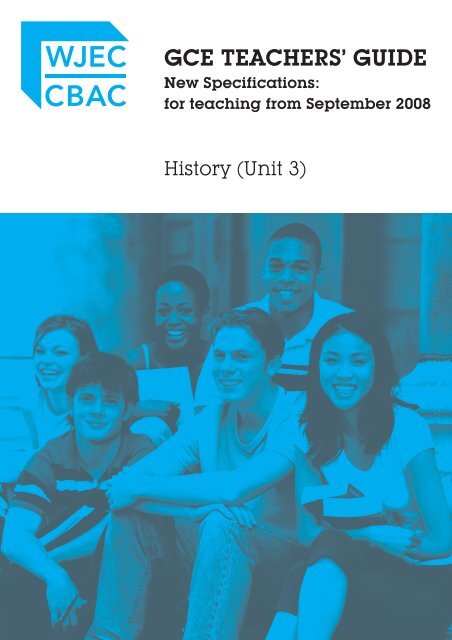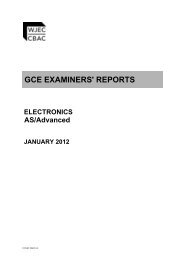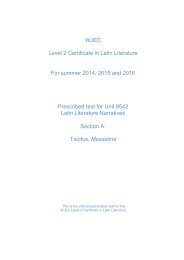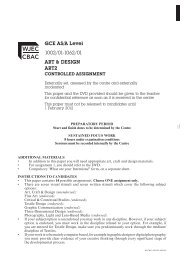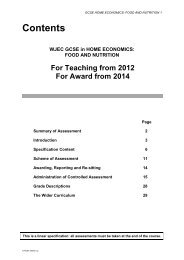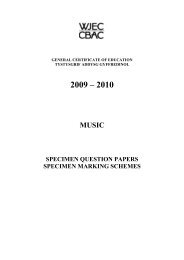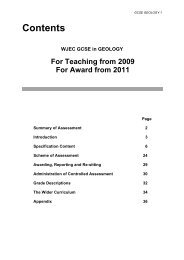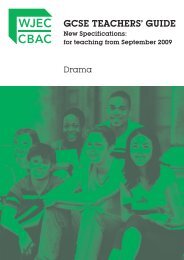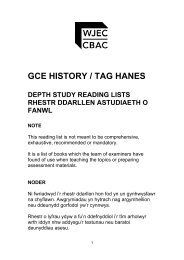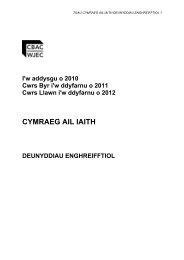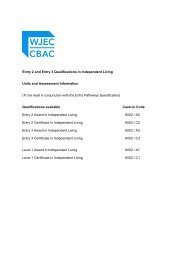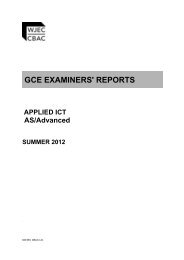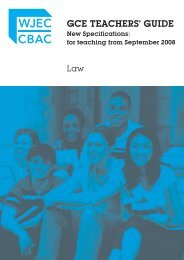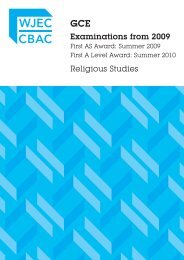GCE History Teachers' Guide - Unit 3 - WJEC
GCE History Teachers' Guide - Unit 3 - WJEC
GCE History Teachers' Guide - Unit 3 - WJEC
Create successful ePaper yourself
Turn your PDF publications into a flip-book with our unique Google optimized e-Paper software.
<strong>GCE</strong> TEACHERS’ GUIDE<br />
New Specifications:<br />
for teaching from September 2008<br />
<strong>History</strong> (<strong>Unit</strong> 3)
Contents<br />
<strong>GCE</strong> AS and A Level HISTORY UNIT 3<br />
<strong>Teachers'</strong> <strong>Guide</strong><br />
<strong>GCE</strong> AS and A HISTORY UNIT 3 <strong>Teachers'</strong> <strong>Guide</strong> 1<br />
Page<br />
Introduction 3<br />
Examples of Approved Questions for <strong>Unit</strong> HY3 9<br />
Exemplar Packs 22<br />
Proposal Form 34<br />
Agreed Standard Marking Scheme 38
INTRODUCTION<br />
<strong>GCE</strong> AS and A HISTORY UNIT 3 <strong>Teachers'</strong> <strong>Guide</strong> 3<br />
<strong>GCE</strong> HISTORY<br />
INITIAL TEACHERS' GUIDE<br />
COMMENTARY ON<br />
INTERNAL UNIT HY3<br />
This teachers' guide has been produced to supplement the revised <strong>WJEC</strong> <strong>GCE</strong><br />
specifications in <strong>History</strong> and the revised sample assessment materials.<br />
It aims to offer support and guidance to teachers in the preparation and administration of the<br />
course.<br />
The advice here is for <strong>Unit</strong> HY3 and is based on section 8 in the <strong>History</strong> specification<br />
which begins on page 71.<br />
Please note that HY3 is internal assessment. This is now compulsory for A level in<br />
Wales and England. There is no examination alternative – the old Route 2 has been<br />
discontinued.<br />
WHAT SORT OF ASSIGNMENT HAS TO BE DONE?<br />
The assignment must be set by the centre and approved by <strong>WJEC</strong> Chief Moderator. It must<br />
be undertaken by the candidate under agreed coursework conditions over an extended<br />
period of time. It is marked by the centre and moderated by an Awarding Body external<br />
moderator. The assignment should take the form of an extended piece of writing<br />
which addresses the historical issue or problem set.<br />
HOW LONG SHOULD THE ASSIGNMENT BE?<br />
The Assignment should be between three and four thousand words in length, excluding<br />
extracts from historical sources and references. Candidates who exceed this word limit will<br />
be penalised, by the centre initially, or later by the Awarding Body moderator, if deemed<br />
necessary. Candidates should not use any more than 15 sources in the writing of their<br />
assignment.
<strong>GCE</strong> AS and A HISTORY UNIT 3 <strong>Teachers'</strong> <strong>Guide</strong> 4<br />
WHAT DOES UNIT 3 ASSESS?<br />
All the assessment objectives will be examined in Assessment HY3. Assessment<br />
Objective 2(b) has a higher weighting in this <strong>Unit</strong> as expected by the subject criteria.<br />
AO1a:<br />
AO1b:<br />
Assessment objectives Weighting<br />
%<br />
Recall, select, deploy historical knowledge & communicate<br />
2½%<br />
knowledge and understanding of history in a clear and effective<br />
manner.<br />
2½%<br />
Demonstrate their understanding of the past through explanation,<br />
analysis and making substantiated judgements<br />
AO2: In relation to the historical enquiry:<br />
(a) analyse and evaluate a range of appropriate source material;<br />
(b) analyse and evaluate how aspects of the past have been<br />
interpreted and represented in different ways<br />
HY3 is now worth 20% of the marks for the A level examination.<br />
HOW IS THE ASSIGNMENT SET?<br />
Centres must choose their own assignment title(s). The assignment must be based on the<br />
in-depth study chosen.<br />
Centres may select up to a maximum of two different assignment titles for each in-depth<br />
study followed<br />
The topic(s) chosen by a centre, which may be taken from any part of the in-depth content<br />
studied, must focus on a substantial or a significant issue. The question set must give rise<br />
to an historical debate, thereby allowing the candidates to consider, through the<br />
study of a range of appropriate sources, at least two differing or contrasting historical<br />
interpretations.<br />
The assignment title(s) selected by the centre may be used up to a maximum of four years<br />
In the previous <strong>GCE</strong> structure, the <strong>WJEC</strong> Chief Moderator approved a range of titles /<br />
questions for internal assessment. Many of these should be suitable again for internal<br />
assessment purposes. A list of suggested and approved questions is available later in<br />
this guide and is also on the <strong>WJEC</strong> website.<br />
7%<br />
8%
HOW ARE THE UNIT 3 ASSIGNMENTS APPROVED?<br />
<strong>GCE</strong> AS and A HISTORY UNIT 3 <strong>Teachers'</strong> <strong>Guide</strong> 5<br />
Centres must submit a valid proposal form including their titles, associated marking schemes<br />
and the initial pack of documents to be used by candidates, to the Awarding Body for<br />
approval, at least six weeks before candidates commence their assignments. A proposal<br />
form is available from the Awarding Body to standardise submissions. Centres must not set<br />
an assignment to candidates until formal written approval has been given by the<br />
Awarding Body Chief Moderator. Once approval has been given, approval will continue for<br />
the remaining years of the four year cycle.<br />
WHAT ABOUT MARK SCHEMES?<br />
It is vital for centres to develop their own mark schemes to suit their chosen assignment<br />
questions. There is a proposal form to submit questions for approval and this contains a<br />
generic mark scheme which can be customised to suit the specific question (s) set. A copy<br />
is at the back of this guide.<br />
WHAT SHOULD THE DOCUMENT PACKS CONSIST OF?<br />
Centres will need new starter packs of documents to begin to prepare their candidates for<br />
the set assignments.<br />
The document packs should include only 8 – 10 sources.<br />
The starter pack should include:<br />
• a range of varying primary evidence such as written accounts, statistics, oral<br />
evidence and visual material, where appropriate<br />
• sources which present and reflect the historical interpretations or debate about the<br />
issue concerned<br />
All sources chosen should be of an appropriate length, but not exceed one side of A4 paper.<br />
All sources should be given the appropriate attributions containing reference to name of<br />
author, author's role, type of source, title of book or source, intended audience and date of<br />
publication / production.<br />
There are examples of three documents packs at the back of this guide. Centres should<br />
look to follow the style laid out in these exemplars in their submissions.
<strong>GCE</strong> AS and A HISTORY UNIT 3 <strong>Teachers'</strong> <strong>Guide</strong> 6<br />
WILL CANDIDATES BE EXPECTED TO DO THEIR OWN RESEARCH?<br />
Candidates must progress to investigate the historical issue through analysis and evaluation<br />
of a range of additional sources. These must be identified independently by the<br />
candidates.<br />
This further research of materials relating to the issue or problem might include:<br />
- historical descriptions and analyses of the issue;<br />
- contemporary first-hand descriptions or accounts;<br />
- contemporary analysis or opinion;<br />
- other accounts, including more than one view or interpretation of the historical<br />
issue;<br />
- the use of video, film or museum representations<br />
It is essential that candidates consider the historiographical context of at least<br />
two differing or contrasting historical interpretations in their response. This<br />
element will need to be researched and set within the context of appropriately<br />
selected sources.<br />
It is also important that candidates select no more than 12-15 sources to analyse and<br />
evaluate in their assignment. The greater number of these should be from those<br />
identified by the candidate through additional research.<br />
Candidates should be encouraged to use ICT in their research and in the<br />
presentation of their assignment.<br />
UNDER WHAT CONDITIONS MUST THE TASK BE UNDERTAKEN?<br />
The assignment must be written by the candidate under approved coursework conditions<br />
over a period of time specified by the centre.<br />
The emphasis that candidates undertake independent research and utilise ICT means that<br />
some work will have to be done away from the classroom. However, it is essential that<br />
the bulk of the work for HY3 is tackled under the supervision of the class teacher in<br />
class-based sessions. It is not acceptable for candidates to be given all or large parts<br />
of the assignment to be done outside class with minimal supervision.<br />
Teachers should encourage candidates to retain any rough notes and materials as evidence<br />
of work done independently. Teachers and candidates will be expected to sign a declaration<br />
stating that the work produced is entirely the work of the candidate.
HOW SHOULD THE ASSIGNMENT BE STRUCTURED?<br />
<strong>GCE</strong> AS and A HISTORY UNIT 3 <strong>Teachers'</strong> <strong>Guide</strong> 7<br />
There is no set or suggested structure to this assignment. However, centres are<br />
encouraged to advise candidates to consider certain aspects:<br />
- assignments must address the question set<br />
- background detail must be limited<br />
- analysis and evaluation of source material should be integrated into any narrative<br />
and / or discussion of historical interpretations<br />
- explanation of relevant historiographical issues<br />
- assignments must build to a substantiated judgement on the question set<br />
- assignments should be coherent, lucid and integrated.<br />
Centres should also ensure that:<br />
- a range of different types of source is used in the assignment<br />
- every page of the assignment is numbered<br />
- the additional sources provided by the candidates are clearly labelled in the body<br />
of the essay<br />
- there is clear reference to the origin and provenance of each of the sources<br />
provided<br />
- there is a bibliography at the end of the essay<br />
- a word count should be provided<br />
- no more than 15 sources in total are used in the completion of the assignment<br />
HOW DO I SELECT THE CORRECT SAMPLE?<br />
The following formula will be applied, subject to the additional considerations listed below.<br />
Marks for the sample must be recorded in rank order (beginning with the highest) on the<br />
Moderation Sample Marksheet.<br />
Total number of<br />
candidates<br />
1 – 10 All<br />
Work to be submitted<br />
(Numbers relate to rank order)<br />
11 - 19 1 st and every second (1, 3, 5, 7 etc.) plus the lowest scoring folder and additional<br />
folders as necessary (reflecting the spread of marks) to make a total sample of 10<br />
20 - 45 1st and every fifth (1, 6, 11, 16 etc.) plus the lowest scoring<br />
folder and additional folders as necessary (reflecting a spread of<br />
marks) to make a total sample of 10<br />
46 - 99 1st and every eleventh (1, 12, 23, 34 etc.) plus the lowest scoring folder and<br />
additional folders as necessary (reflecting a spread of marks) to make a total<br />
sample of 10<br />
100 - 199 1 st and every fourteenth (1, 15, 29, 43 etc.) plus the lowest scoring folder and<br />
additional folders as necessary (reflecting a spread of marks) to make a total<br />
sample of 15<br />
200 – 299 1st and every fifteenth (1, 16, 31, 46 etc.) plus the lowest scoring<br />
folder and additional folders as necessary (reflecting spread of<br />
marks) to make a total sample of 25<br />
Over 300 1st and every twentieth (1, 21, 41, 61 etc.) plus the lowest<br />
scoring folder and additional folders as necessary (reflecting<br />
spread of marks) to make a total sample of 25
<strong>GCE</strong> AS and A HISTORY UNIT 3 <strong>Teachers'</strong> <strong>Guide</strong> 8<br />
Clearly indicate on the Moderation Sample Marksheet (where applicable) the<br />
total number of candidates entered.<br />
N.B. In addition, the following points should be considered in selecting the sample:<br />
(i) Each teaching group should be represented.<br />
(ii) Where there are several candidates on a particular mark these will<br />
count towards the total number in calculating the rank order, but<br />
normally only one candidate's work on a particular mark will be<br />
submitted.<br />
(iii) Work submitted should where possible meet the full requirements of<br />
the specification; i.e. incomplete work should not be included, but be<br />
replaced by that of the nearest candidate (either higher or lower) with<br />
complete work.<br />
(iv) Where appropriate, work in both English and Welsh should be<br />
submitted from bilingual centres.<br />
<strong>WJEC</strong> may request further samples of work to be sent to the moderators if this<br />
is considered necessary. <strong>WJEC</strong> also reserves the right to call in all work for remarking<br />
where moderation identifies significant problems in the initial<br />
marking.<br />
WHO MARKS THE ASSIGNMENT?<br />
The assignment will be marked within the centre. The teacher marking the work will apply<br />
the criteria and level descriptors as laid down in the mark scheme, as developed by the<br />
centre and approved by the Chief Moderator. If there is more than one teaching group within<br />
a centre, internal standardisation must be carried out in line with the Awarding Body's<br />
guidelines. A sample of the completed assignments, from a specified range of candidates,<br />
should be sent to a nominated Awarding Body moderator. <strong>WJEC</strong> will issue instructions to<br />
centres on the criteria that should be used in selecting candidates' work.<br />
WHAT ABOUT MODERATION?<br />
All work submitted for HY3 must be appropriately assessed and moderated. The moderation<br />
will take the form of sampling of a range of candidate's work by an Awarding Body<br />
moderator. The moderator will determine whether the approved mark scheme has been<br />
applied accurately and consistently and make appropriate recommendations to the Chief<br />
Moderator and Awarding Body subject officer.
<strong>GCE</strong> AS and A HISTORY UNIT 3 <strong>Teachers'</strong> <strong>Guide</strong> 9<br />
EXAMPLES OF APPROVED QUESTIONS FOR UNIT HY3<br />
These questions all incorporate an area of historical debate.<br />
Centres are invited to select from this list, or to develop their own questions, based on their<br />
particular preference.<br />
All questions, whether taken from this list or not, will need to be approved by the Chief<br />
Moderator.<br />
WALES AND THE TUDOR STATE /<br />
CYMRU A'R WLADWRIAETH DUDUDAIDD<br />
'The dissolution of the monasteries occurred largely because of the greed of Henry VIII.'<br />
How valid is this assessment of the reason for the dissolution of the monasteries in 1536 and<br />
1539?<br />
'Cyflwr gwael tai crefyddol Cymru oedd prif gymhellia y wladwriaeth Duduraid i'w didymu.'<br />
Pa mor ddilys yw'r asesiad hwn o bolisi'r Tuduriad o ddimynu mynachlogydd Cymru?
<strong>GCE</strong> AS and A HISTORY UNIT 3 <strong>Teachers'</strong> <strong>Guide</strong> 10<br />
THE GREAT REBELLION /<br />
Y CHWYLDRO MAWR<br />
'Parliament was more responsible for the outbreak of the Civil War than the King.'<br />
How valid is this assessment of the outbreak of the First Civil War?<br />
[Exemplar provided]<br />
'The First Civil War had no significant impact on daily life.'<br />
How valid is this assessment of the impact of the First Civil War?<br />
'The Levellers offered the only practical solution to the constitutional problems of England.'<br />
How valid is this assessment of the Levellers?<br />
'Charles I deserves to be regarded as his own executioner.'<br />
How valid is this assessment of events that led to the execution of Charles I?<br />
'The Ranters were insignificant. There was no Ranter sect or movement and no Ranter<br />
theology.'<br />
How valid is this assessment of the Ranter phenomenon during the Great Rebellion?<br />
'Cromwell's experiment with the Major-Generals was an unmitigated disaster.'<br />
How valid is this assessment of the rule of the Major-Generals?
<strong>GCE</strong> AS and A HISTORY UNIT 3 <strong>Teachers'</strong> <strong>Guide</strong> 11<br />
REFORM AND PROTEST /<br />
DIWYGIO A PHROTEST<br />
'The threat of revolution was the main factor behind the passing of the Reform Act of<br />
1832.'<br />
How valid is this assessment of the passing of the Reform Act of 1832?<br />
[Exemplar provided]<br />
'The Reform Act of 1832 was passed mainly as a result of public pressure.'<br />
How valid is this assessment of the importance of public pressure in the passing of the<br />
Reform Act in 1832?<br />
'By 1846, Peel had no other option than to repeal the Corn Laws.'<br />
How valid is this assessment of the Repeal of the Corn Laws?<br />
'The Rebecca Riots were no more than a violent outburst against the injustice of the turnpike<br />
system.'<br />
How valid is this assessment of the causes and nature of the Rebecca riots of the late 1830s<br />
and early 1840s?<br />
'The tollgates were undoubtedly the major issue which caused the outbreak of protest in<br />
West Wales, 1839-1843.'<br />
How valid is this assessment of the causes of the Rebecca movement in West Wales?
<strong>GCE</strong> AS and A HISTORY UNIT 3 <strong>Teachers'</strong> <strong>Guide</strong> 12<br />
'Gwrthrhyfel a gododd o anobaith.'<br />
Pa mor ddilys yw'r asesiad hwn o derfysgoedd Beca?<br />
'The success of the Rebecca movement has been much exaggerated: it did little to remove<br />
the underlying grievances in rural Wales.'<br />
How valid is this assessment of the Rebecca movement in West Wales?<br />
'The events in Newport on 3-4 th November 1939 were a genuine attempt at a rising which<br />
posed a serious threat to the Government.'<br />
How valid is this assessment of the Newport Rising?
<strong>GCE</strong> AS and A HISTORY UNIT 3 <strong>Teachers'</strong> <strong>Guide</strong> 13<br />
CHANGE AND CONFLICT /<br />
NEWID A GWRTHDARO<br />
'The grievances of the workforce were the most significant factor in causing the Cambrian<br />
Combine dispute and subsequent riots. '<br />
How valid is this assessment of the events at Tonypandy in 1910?<br />
'Digwyddodd anghydfod y Cambrian Combine a Therfysg Tonypandy yn unig oherwydd<br />
gweithredoedd perchnogion y pyllau glo.'<br />
Pa mor ddilys yw'r asesiad hwn o achosion Terfsgoedd Tonypandy?<br />
'The Cambrian Combine dispute and the Tonypandy Riots were brought about solely by the<br />
actions of the coal owners.'<br />
How valid is this assessment of events at Tonypandy in 1910?
<strong>GCE</strong> AS and A HISTORY UNIT 3 <strong>Teachers'</strong> <strong>Guide</strong> 14<br />
BRITAIN 1929-1939 /<br />
PRYDAIN, 1929-1939<br />
'The Great Depression of the early 1930s devastated rural Wales even more than it<br />
devastated industrial South Wales.'<br />
How valid is this assessment of the effects of the Great Depression on Wales in the 1930s?<br />
'Chamberlain followed the only realistic policy for Britain in the Munich crisis of 1938.'<br />
How valid is this assessment of Chamberlain's policy during the Czech crisis?<br />
'Yn ystod Argyfwng Munich 1938, dilynodd Chamberlain yr unig bolisis realisteg ar gyfer<br />
Prydain.'<br />
Pa mor ddilys yw'r asesiad hwn o bolisi Chamberlain yn ystod Argyfwng Tsiecoslofacia,<br />
1938?<br />
'Chamberlain deserves to be judged as a 'guilty man' for his policy of appeasement towards<br />
Germany, 1937-1939.'<br />
How valid is this assessment of Chamberlain's foreign policy up to the declaration of war in<br />
September 1939?
<strong>GCE</strong> AS and A HISTORY UNIT 3 <strong>Teachers'</strong> <strong>Guide</strong> 15<br />
THE GERMAN REFORMATION /<br />
Y DIWYGIAD YN YR ALMAEN<br />
'The Tetzel Mission was the most significant cause of the German Reformation.'<br />
How valid is this assessment of the Tetzel Mission of 1517?<br />
'Luther, more than anyone, was to blame for the schism.'<br />
How valid is this assessment of Luther's role in the schism?<br />
'The Roman Catholic Church was more responsible for the Lutheran Reformation than<br />
Luther himself.'<br />
How valid is this assessment of the Lutheran Reformation up to 1521?<br />
'Martin Luther was solely responsible for the outcome of the Diet of Worms.'<br />
How valid is this assessment of the part Luther played in the Diet of Worms?<br />
'The work of Martin Luther was the most important factor in the causes of the German<br />
Peasant's War in 1524-1525.'<br />
How valid is this assessment of the causes of the Peasants' War, 1524-1525?<br />
'Luther never had any intention of betraying the peasants.'<br />
How valid is this assessment of Luther's relationship with the peasants?
<strong>GCE</strong> AS and A HISTORY UNIT 3 <strong>Teachers'</strong> <strong>Guide</strong> 16<br />
THE FRENCH REVOLUTION /<br />
Y CHWYLDRO FFRENGIG<br />
'The war of 1792 was caused by ideological differences.'<br />
How valid is this assessment of the causes of the war of 1792?<br />
'Brissot, above all others, was responsible for the war of 1792.'<br />
How valid is this assessment of the outbreak of the war of 1792?<br />
'Roedd dienyddiad Louis yn ganlyniad i'r penderfyniad i fyn i ryfel.'<br />
Pa mor ddilys yw'r asesiad hwn o ddienyddiad Louis yn 1792?<br />
'The collapse of legitimate authority was the only reason for the September Massacres.'<br />
How valid is this assessment of the September Massacres?<br />
'The Civil Constitution of the Clergy was the main cause of the counter-revolution in Western<br />
France.'<br />
How valid is this assessment of the causes of counter-revolutionary activities in Western<br />
France between 1790 and 1794?<br />
'The Revolutionary Government followed the only realistic policy in violently suppressing the<br />
Vendee rising.'<br />
How valid is this assessment of the Revolutionary Government's actions during the Terror?
<strong>GCE</strong> AS and A HISTORY UNIT 3 <strong>Teachers'</strong> <strong>Guide</strong> 17<br />
THE CRISIS OF THE AMERICAN REPUBLIC, 1848-187<br />
'Southern slavery was without doubt a system of ruthless exploitation.'<br />
How valid is this assessment of slavery in the southern states of the USA prior to the Civil<br />
War?<br />
'The main cause of the secession of the southern states in 1861 was the election of Lincoln<br />
in 1860.'<br />
How valid is this assessment of the reasons for the secession of the southern states?<br />
'The confederacy lost the civil war largely because of its own mistakes.'<br />
How valid is this assessment of the reasons why the confederacy lost the civil war?<br />
'The most effective and able general of the Civil War was Grant.'<br />
How valid is this assessment of the reputation of generals in the Civil War?
<strong>GCE</strong> AS and A HISTORY UNIT 3 <strong>Teachers'</strong> <strong>Guide</strong> 18<br />
NAZI GERMANY /<br />
YR ALMAEN NATSIAIDD<br />
'Hitler had achieved a major triumph at Munich.'<br />
How valid is this assessment of the Munich Agreement of 1938?<br />
[Exemplar provided]<br />
'At Munich, Hitler gained what he wanted and achieved conquest without firing a shot.'<br />
How valid is this assessment of the outcome of the Munich Agreement?<br />
'Hitler saw Munich as a cause for celebration.'<br />
How valid is this assessment of the outcome of the Munich Agreement?<br />
'Hitler saw the outcome of his actions involving Czechoslovakia as no cause for celebration.'<br />
How valid is this assessment of Hitler's policies towards Czechoslovakia in 1938-1939?<br />
'Llwyddod Hitler i gael yr hyn oedd ei eisiau yn Munich gan oresgyn heb danio dryll.'<br />
Pa mor dilys yw'r asesiad hun o ganlyniad cytundeb Munich 1938?<br />
'The Munich Agreement was a triumph for Hitler which resulted from his opportunistic<br />
approach to foreign policy.'<br />
How valid is this assessment of Hitler's handling of the Czech crisis of 1938?<br />
'Hitler planned for world war through a series of annexations during the 1930s.'<br />
How valid is this assessment of the Czech crisis of 1938?
<strong>GCE</strong> AS and A HISTORY UNIT 3 <strong>Teachers'</strong> <strong>Guide</strong> 19<br />
'Mae digwyddiadau 1938 yn ymwneud a Tsiecoslifacia yn dangos bod Hitler yn gwybod yn<br />
union beth oedd ei eisiau a sut fyddai yn ei gael.'<br />
Pa mor ddilys yw'r asesiad hwn o bolisi tramor Hitler ym 1939?<br />
'The aim of the Nazi-Soviet Pact was to provoke war against France and Britain by attacking<br />
Poland.'<br />
How valid is this assessment of Hitler's foreign policy in 1939?<br />
'Bwriad Hitler wrth arwyddo'r Cytundeb Natsi-Sofietaidd oedd pryfocio rhyfel gyda Phrydain a<br />
Ffrainc drwy ymosod ar wlad Pwyl.'<br />
Pa mor ddilys yw'r asesiad hwn o polisi tramor Hitler ym 1939?<br />
'There was no resistance movement and there couldn't be inside Nazi Germany.'<br />
How valid is this assessment of opposition to Hitler and his government in the years 1938-<br />
1945?<br />
'The July Plot stemmed from the rejection of Hitler by the German people.'<br />
How valid is this assessment of the July Plot of 1944?<br />
'A very small clique of ambitious, conscienceless, criminal and stupid officers.'<br />
How valid is this assessment of the men who plotted against Hitler in 1944?<br />
'The July Plot failed largely because of popular support for Hitler.'<br />
How valid is this assessment of the outcome of the July Plot of 1944?
<strong>GCE</strong> AS and A HISTORY UNIT 3 <strong>Teachers'</strong> <strong>Guide</strong> 20<br />
'An ill-conceived plot attempted by reckless men who many considered to be traitors.'<br />
How valid is this assessment of the July Plot, 1944?<br />
'These were desperate and courageous men and their purpose was honourable but doomed<br />
to failure.'<br />
How valid is this assessment of the July Plot of 1944?<br />
'The Wansee Conference was entirely responsible for the Holocaust.'<br />
How valid is this assessment of the Holocaust?<br />
'The increasing difficulties of Operation Barbarossa were the spur into genocide.'<br />
How valid is this assessment of the origins of the genocide in Europe during World War II?<br />
'Achoswyd yr Ateb Terfynol gan amgylchiadau rhyfel yn unig.'<br />
Pa mor ddilys yw'r gosodiad hwn o pam digwyddodd yr Ateb Terfynol?<br />
'The circumstances of the war were entirely responsible for the Holocaust.'<br />
How valid is this assessment of the Holocaust?<br />
'The Holocaust was the result of Hitler's long held grand design to pursue a programme of<br />
annihilation against the Jews.'<br />
How valid is this assessment of the Holocaust?
EXEMPLAR PACKS<br />
<strong>GCE</strong> AS and A HISTORY UNIT 3 <strong>Teachers'</strong> <strong>Guide</strong> 21<br />
The following pages contain three exemplar document packs. Centres are advised to<br />
follow this style in constructing their own starter packs. In particular attention should<br />
be given to the attributions of the sources to enable full source evaluation to take<br />
place.
<strong>GCE</strong> AS and A HISTORY UNIT 3 <strong>Teachers'</strong> <strong>Guide</strong> 22<br />
EXEMPLAR 1<br />
'Parliament was more responsible than the King for the outbreak of the Civil War.'<br />
How valid is this assessment of the outbreak of the first Civil War?<br />
DOCUMENT 1<br />
'It was in Parliament and particularly in the House of Commons that the opposition built its<br />
institutional base. Men fought and even paid to be members of it, instead of having to be<br />
paid their expenses as an inducement to serve. With its control over taxation, especially for<br />
war, and its control over legislation, especially concerning religion, it was strategically placed<br />
to demand redress of grievances. During the course of the sixteenth and seventeenth<br />
centuries, many things happened to increase Parliament's powers and to diminish the<br />
capacity of the Crown to control it. The House of Commons grew from about 300 to 500.<br />
The members gained experience and a sense of continuity owing to the enhanced frequency<br />
of Parliamentary sessions between 1590 and 1614. They developed an efficient committee<br />
system, which freed them from manipulation by a Crown appointed Speaker, and by the<br />
early seventeenth century Parliamentary leaders were beginning to emerge, men who built<br />
their careers on playing key roles in debates and on committees in the House. The Crown<br />
had trouble with this body at all times in the late sixteenth and early seventeenth centuries,<br />
but slowly the nature of the trouble changed and became far more menacing.<br />
DOCUMENT 2<br />
[Lawrence Stone, an academic historian and specialist in<br />
early modern British history, writing in a specialist text-book,<br />
The Causes of the English Revolution (1972)]<br />
'And whereas by command from Us, we did by our Serjeant of Armes demand them in our<br />
House of Commons, that their Persons might accordingly be arrested for High Treason, to<br />
which demand we have received from the said House a message only, where we expected<br />
Obedience. We went our Selfe the next day in Person to our said House of Commons,<br />
requiring the delivery up of the said Persons, but found that they (being struck with the<br />
conscience of their own guilt of so heinous crimes) were absent and fled, not willing to<br />
submit themselves to Justice, there being in us no intention at all to use any force against<br />
them, or any of them, but to proceed against them in a legal, fair way. We have therefore<br />
thought fit to publish this their escape and command all Justices of Peace, Mayors, Sheriffs,<br />
Bailiffs, Constables to use their best diligence and industry in inquiring and searching for the<br />
said Denzell Hollis, Sir A. Haslerigge, J. Pym, J. Hampden and William Strode. And if they<br />
shall find them, send them with sufficient guard, unto our Tower of London. And if any<br />
Person shall directly conceal or maintain the said Hollis, Haslerigge, Pym, Hampden and<br />
Strode, we will proceed against them for their said neglect of this Our commandment, with all<br />
severity.'<br />
[From a declaration issued on behalf of the King, demanding the arrest of five members of<br />
Parliament (January 1642)]
DOCUMENT 3<br />
DOCUMENT 4<br />
<strong>GCE</strong> AS and A HISTORY UNIT 3 <strong>Teachers'</strong> <strong>Guide</strong> 23<br />
[From an anonymous contemporary tract celebrating the execution of<br />
the Earl of Strafford (1641)]<br />
'What will you fight, for a Book of Common Prayer?<br />
What will you fight, for a Court of High Commission?<br />
What will you fight, for a mitre gilded fair?<br />
Or to maintain the prelates' proud ambition?<br />
What will you get? Your yoke will be lighter<br />
For when we're slain, the rod comes to your breech.'<br />
DOCUMENT 5<br />
[From a ballad written by an anonymous Scottish balladeer for an<br />
English audience during the Bishops' Wars (1640)]<br />
'The native Catholic population of Ulster rose up in armed rebellion against their Protestant<br />
landowners. A great deal of violence followed, such as the massacre at Portadown Bridge.<br />
Both Catholics and Protestants massacred their opponents. The Irish rebellion heightened<br />
the political crisis in England by raising the politically explosive issue of who should control<br />
the army.<br />
[Barry Coward and Chris Durston, academic historians and specialists in sixteenth century<br />
British history, writing in an Advanced Level history textbook, The English Revolution (1997)]
<strong>GCE</strong> AS and A HISTORY UNIT 3 <strong>Teachers'</strong> <strong>Guide</strong> 24<br />
DOCUMENT 6<br />
'Spain and France are joining together to root out our religion. They have a large number of<br />
soldiers ready to invade us. The great business of providing money for ships is too heavy<br />
for the port towns and neighbouring shires to bear alone, therefore the Council have cast up<br />
the whole charge of the fleet, and have divided it among all the counties.'<br />
DOCUMENT 7<br />
[From a letter written by King Charles I to the Sheriff of Montgomery<br />
demanding the payment of Ship Money (1637)]<br />
[A map showing the extent of Ship Money taxation in 1636.<br />
Ship Money was levied heavily in Midland counties that<br />
had no tradition at all of supporting maritime defence.]
DOCUMENT 8<br />
<strong>GCE</strong> AS and A HISTORY UNIT 3 <strong>Teachers'</strong> <strong>Guide</strong> 25<br />
'The Parliamentarians produced thousands of pamphlets in an attempt to persuade people<br />
to support their cause. Although some of these were distributed in Wales they had very little<br />
impact on the Welsh people. The main problem was that these pamphlets were in English, a<br />
language that large numbers of the population did not understand.<br />
People's business interests also affected their political allegiance. To obtain money<br />
the King had sold monopoly rights to businessmen. Those men who had profited from these<br />
monopoly rights supported the King, whereas those who had been denied the opportunity of<br />
trading in these goods often supported Parliament. People who lived and worked in the<br />
more economically advanced areas tended to favour Parliament. This was especially true of<br />
towns such as the Puritan dominated port of Bristol. People living in rural areas knew very<br />
little about the political disagreements between the King and Parliament. They were also<br />
likely to have had much contact with Puritan preachers. These people were strongly under<br />
the influence of the local clergy and gentry. The vast majority of people did not hold strong<br />
views on the dispute between King and Parliament and tried as hard as possible to stay out<br />
of the conflict.'<br />
[John Simkin, an academic historian and author of text-books, writing in a<br />
text-book for schools, The Civil War in Wales (1995)]
<strong>GCE</strong> AS and A HISTORY UNIT 3 <strong>Teachers'</strong> <strong>Guide</strong> 26<br />
EXEMPLAR 2<br />
'The threat of revolution was the main factor behind the passing of the Reform Act of<br />
1832.'<br />
How valid is this assessment of the passing of the Reform Act of 1832?<br />
DOCUMENT 1<br />
'Let us not misunderstand the character of reform in this period. The Tory and Whig<br />
reformers did not embrace reform as a matter of principle or social justice. We can use a<br />
seeming contradiction to make our point here. If 1832 was a revolution, it was a revolution<br />
to avoid a revolution. The point of the paradox is that the reformers of the 1830s were only<br />
prepared to introduce change in order to prevent the build-up of radical and revolutionary<br />
pressures. Reform was essentially a preventative move.'<br />
DOCUMENT 2<br />
[Michael Lynch, an academic historian and specialist in nineteenth century<br />
British history, writing in a general text-book,<br />
Nineteenth century British history (1999)]<br />
'The most inflammatory bills have been freely circulated, calling on the populace to arm<br />
themselves and imitate the heroic acts of the Bristol men. There are strong indications of an<br />
expectation of insurrection against property amongst the lower orders. This detestable<br />
Reform Bill has raised the hopes of the lowermost. At Plymouth and the neighbouring<br />
towns, the spirit is tremendously bad. The shopkeepers are almost all Dissenters, and such<br />
is the rage on the questions of Reform at Plymouth, that I have received the most earnest<br />
requests that I will not some to the town, as I had engaged to do. They assure me that my<br />
own person, and the security of the public peace, would be in the greatest danger.'<br />
[The Bishop of Winchester, writing in a private letter to the leader of the Tory opposition, the<br />
Duke of Wellington (November 1831)]
DOCUMENT 3<br />
<strong>GCE</strong> AS and A HISTORY UNIT 3 <strong>Teachers'</strong> <strong>Guide</strong> 27<br />
[A cartoon entitled 'Social Reform' by George Cruikshank, published in 1819.<br />
The monster is shouting "I'm coming ! I'm coming ! I shall have you ! And though I'm at your<br />
heels now, I'll be at your heads soon.'<br />
DOCUMENT 4<br />
'The great fount of evil is the rotten boroughs, from which has flowered national calamities,<br />
ruinous wars, lavish expenditure and enormous debt. They are the obstacle to every social<br />
improvement – civil, commercial, legal and constitutional. By means of them the nobility<br />
have been able to double their private incomes and to fill every lucrative office in the army,<br />
navy and public administration with their friends and dependants. Because of all the<br />
boroughs, all our institutions are oppressive and aristocratic: all is privilege.'<br />
[From an anonymous radical publication,<br />
The Extraordinary Black Book (1831)]
<strong>GCE</strong> AS and A HISTORY UNIT 3 <strong>Teachers'</strong> <strong>Guide</strong> 28<br />
DOCUMENT 5<br />
'It must be clear that the Great Reform Act was not based upon any accurate knowledge of<br />
the nature of contemporary society. A major point in the arguments of the reformers was<br />
their acceptance of a broad, but extremely vague, notion of a middle class, endued with<br />
certain values. Closer scrutiny reveals that it is very difficult to find the 'middle classes' that<br />
the Whigs talked so much about in the 1830s.<br />
The principal support for Parliamentary reform came from within the government<br />
minorities in the highly unequal society. The kind of reform that the Whigs were proposing in<br />
1831 evoked widespread support amongst powerful and influential interests. The 'country'<br />
interest had long regarded the pocket and rotten boroughs as a basis for government<br />
corruption and the Whig Bill seemed to meet these objections. The proposers were people<br />
like Durham and Grey, who were themselves leading aristocratic landowners. Furthermore<br />
the Bill would entail a reduction in the number of borough seats and a considerable<br />
extension of county representation.<br />
The Tories knew that by opposing the Bill they had alienated much of their support.<br />
The Whigs knew that they could count on not merely the noisy and embarrassing support of<br />
radicals but also on the bulk of respectable opinion. The 1831 general election provided the<br />
Whigs with a decisive majority for reform on the old unreformed franchise and on the old<br />
unreformed distribution of seats. In some places, enthusiasm and agitation for reform<br />
played some part, but the overwhelming swing of the county seats to reform in 1831 is not to<br />
be explained by a reaction to the threat from working-class movements.'<br />
[Norman McCord, an academic historian and specialist in nineteenth century British history,<br />
writing in a specialist book, The Age of Reform (1991)]<br />
DOCUMENT 6<br />
'It may be asked,<br />
Will a reform of Parliament give the labouring man a cow or a pig?<br />
Will it put bread and cheese into his satchel instead of infernal cold potatoes?<br />
Will it give him a bottle of beer to carry to the field instead of making him lie down on his<br />
belly to drink out of the brook?<br />
Will it put upon his back a Sunday coat and send him to Church instead of leaving him to<br />
stand lounging about shivering with an unshaven face and a carcass covered with a ragged<br />
smock-frock, with a filthy cotton shirt beneath it as yellow as a kite's foot?<br />
Will it put an end to the harnessing of men and women by a hired overseer to draw carts like<br />
beasts of burden?<br />
The enemies of reform jeeringly ask us, whether reform would do these things for us, and I<br />
answer distinctly that IT WOULD DO THEM ALL !'<br />
[William Cobbett, a radical journalist and activist, writing in his newspaper,<br />
The Political Register (April 1831)]
DOCUMENT 7<br />
<strong>GCE</strong> AS and A HISTORY UNIT 3 <strong>Teachers'</strong> <strong>Guide</strong> 29<br />
'Ministers found, in the course of the last session, that there was a large majority in this<br />
House against the principle of the Reform Bill. Now, my Lords, what is the ordinary course<br />
for a Minister, under such circumstances, to pursue?<br />
It is to alter the measure to make it more palatable.<br />
But in this case, the Minister says "No, I will next Session bring in a Bill as efficient as<br />
that which has just been rejected." And then what did the Minister do? Notwithstanding the<br />
opposition of the House, he brought in a measure stronger and worse than anyone of the<br />
measures introduced before. And this measure he wished to force through the House by a<br />
large creation of Peers.<br />
I ask, my Lords, is there anyone blind enough not to see that if a Minister can, with<br />
impunity, advise his Sovereign to such an unconstitutional exercise of his prerogative as to<br />
thereby decide all questions in the House, there is absolutely an end put to the power and<br />
objects of deliberation in this House – and end to all just and proper means of decision.<br />
I say then, my Lords, thinking as I do, it was my duty to counsel his Majesty to resist<br />
this advice.'<br />
DOCUMENT 8<br />
[The Duke of Wellington, former Prime Minister and leader of the Tories,<br />
in a speech to the House of Lords (May 1832)]<br />
'Led by Earl Grey, the Whigs were still an aristocratic party who believed in the worth of the<br />
British constitution. They had a more liberal outlook than the Tories and were aware of the<br />
level of discontent in the country as a whole. Their decision to push for reform had three<br />
motivations. Firstly, they wanted to enact a moderate reform that would make the system<br />
fairer without actually giving in to the demands of the working classes. Secondly, it would<br />
harm the Tories in the eye of the public if the Whigs were seen to be 'the party of reform' and<br />
thus the party of the population at large. Lastly, the people in the towns that would be<br />
enfranchised were generally Whigs anyway, as they were the party of choice for rich men<br />
who didn't own aristocratic land. To allow these people influence would mean a larger ratio<br />
of Whigs to Tories in Parliament.'<br />
[From an internet information site, http://az.essortment.com/greatreformact_omk.htm<br />
(2007)]
<strong>GCE</strong> AS and A HISTORY UNIT 3 <strong>Teachers'</strong> <strong>Guide</strong> 30<br />
EXEMPLAR 3<br />
'Hitler had achieved a major triumph at Munich.'<br />
How valid is this assessment of the Munich Agreement of 1938?<br />
DOCUMENT 1<br />
'Hitler had got what he wanted and had achieved another great conquest without firing a<br />
shot. His prestige soared to new heights. No one who was in Germany in the days after<br />
Munich, as this writer was, can forget the rapture of the German people. They were relieved<br />
that war had been averted; they were elated and swollen with pride at Hitler's bloodless<br />
victory, not only over Czechoslovakia, but over Great Britain and France.<br />
[William Shirer, an American journalist and historian, writing in a specialist study of Nazi<br />
Germany, The Rise and Fall of the Third Reich (1959)]<br />
DOCUMENT 2<br />
'I will begin by saying what everybody would like to ignore and forget but which must<br />
nevertheless be stated, namely that we have sustained a total defeat and that France has<br />
suffered more than we have. All is over. Silent, mournful, abandoned, broken<br />
Czechoslovakia recedes into the darkness. This is only the first sip, the first foretaste of a<br />
bitter cup which will be offered to us year by year unless, by a supreme recovery of our<br />
moral strength and military vigour, we arise again and take our stand for freedom as in the<br />
olden times.'<br />
[Winston Churchill, a backbench MP, in a speech in the House of Commons (October 5 th<br />
1938)]
DOCUMENT 3<br />
DOCUMENT 4<br />
<strong>GCE</strong> AS and A HISTORY UNIT 3 <strong>Teachers'</strong> <strong>Guide</strong> 31<br />
[A cartoon titled 'Watchful Waiting' published in an American newspaper,<br />
The Daily Californian (October 1938)]<br />
'We, the German Fuhrer and Chancellor, and the British Prime Minister, have had a further<br />
meeting today and are agreed in recognising that the question of Anglo-German relations is<br />
of first importance for the two countries and for Europe.<br />
We regard the agreement signed last night and the Anglo-German Naval agreement<br />
as symbolic of the desire of our two peoples never to go to war with one another again.<br />
We are resolved that the method of consultation shall be the method adopted to deal<br />
with any other questions that may concern our two countries, and we are determined to<br />
continue our efforts to remove possible sources of difference, and thus to contribute to<br />
assure the peace of Europe.'<br />
[Neville Chamberlain, British Prime Minister, in a public statement given on his return to<br />
London after the Munich conference (30 th September 1938)]
<strong>GCE</strong> AS and A HISTORY UNIT 3 <strong>Teachers'</strong> <strong>Guide</strong> 32<br />
DOCUMENT 5<br />
'Hitler's comments at the Hossbach meeting had already made it plain. He was aiming not<br />
just at the incorporation of the Sudetenland into the German Reich, but at destroying the<br />
state of Czechoslovakia itself. By the end of May, this aim, and its timing meant war –<br />
certainly against Czechoslovakia, and probably against the Western powers. Hitler, it<br />
became unmistakenly plain, actually wanted war. "Long live war – even if it lasts from two to<br />
eight years," he would proclaim to the Sudeten leader Konrad Henlein. Hitler felt cheated of<br />
the greater triumph which he was certain would have come from the limited war against the<br />
Czechs, which had been his aim all summer. Even military action for the more restricted<br />
goal of attaining the Sudetenland by force had been denied him.'<br />
[Ian Kershaw, an academic historian and specialist in the Nazi period, writing in a specialist<br />
book, Hitler: a Profile in Power (1991)]<br />
DOCUMENT 6<br />
'After his meeting with Chamberlain, the Fuhrer spoke a long time to me and Schmundt over<br />
the results of the agreement. My impression is that he really liked the old gentleman and<br />
desires to negotiate more with him. The Fuhrer expressed the thought that things could now<br />
finally quieten down. He himself at present is in no way thinking on any kind of a step which<br />
might politically become dangerous. First, at the very least, the newly won prizes must be<br />
digested. And then too the solution of the controversial question with Poland won't run<br />
away. At a given time, he would proceed to soften up the Poles, for which task he would use<br />
the same methods that have now proven useful with the Czechs. In the long run however,<br />
peaceful quiet could be maintained only if the entire Versailles Treaty were annulled.'<br />
[Major Gerhard Engel, Hitler's army adjutant from 1938-1943, writing in his diary entry on<br />
October 1 st 1938. His diaries were published in German in 1976 and first published in<br />
English in 2006 and called<br />
At the Head of the Reach: the Secret Diaries of Gerhard Engel]<br />
DOCUMENT 7<br />
'It was on the eve of Munich that I realized beyond a doubt that the enemies of the Third<br />
Reich were determined to have our hide at all costs and that there was no possibility of<br />
coming to terms with them. When that arch-capitalist bourgeois Chamberlain, with his<br />
deceptive umbrella in his hand, put himself to the trouble of going all the way to<br />
Berchtesgaden to discuss matters, he knew very well that he really intended to wage<br />
ruthless war against us. He was quite prepared to tell me anything which he thought might<br />
serve to lull my suspicions. His one and only object in undertaking this trip was to gain time.<br />
What we ought then to have done was to strike at once. We ought to have gone to war in<br />
1938. It was the last chance we had of localizing the war.<br />
But they gave way all along the line and, like the poltroons that they are, ceded to all<br />
our demands. Under such conditions it was very difficult to seize the initiative and<br />
commence hostilities. At Munich we lost a unique opportunity of easily and swiftly winning a<br />
war that was inevitable in any case. Although we were ourselves not fully prepared, we<br />
were nonetheless better prepared than the enemy. September 1938 would have been the<br />
most favourable date.'<br />
[Adolf Hitler, in an alleged conversation with an unknown acquaintance, recorded by Martin<br />
Bormann, Hitler's secretary on February 1945. The transcript was found in Bormann's notes<br />
in the bunker]
DOCUMENT 8<br />
TOP SECRET, MILITARY<br />
Supreme Commander of the Wehrmacht<br />
To: The Commanders-in Chief of the German armed services<br />
<strong>GCE</strong> AS and A HISTORY UNIT 3 <strong>Teachers'</strong> <strong>Guide</strong> 33<br />
Berlin, 30 th May 1938<br />
It is my unalterable decision to smash Czechoslovakia by military action in the near future. It<br />
is in the business of the political leadership to await or bring about the suitable moment from<br />
a political and military point of view. An unavoidable development of events within<br />
Czechoslovakia, or other political events in Europe providing a suddenly favourable<br />
opportunity which may never occur, may cause me to take early action. The proper choice<br />
and determined exploitation of a favourable moment is the surest guarantee of success. To<br />
this end preparations are to be made immediately.<br />
The following are necessary before the intended attack:<br />
(a) A convenient apparent excuse and, with it,<br />
(b) Adequate political justification,<br />
(c) Action not expected by the enemy which will find him in the least possible state of<br />
readiness.<br />
Most favourable from a military as well as a political point of view would be lightning action<br />
as a result of an incident which would subject Germany to unbearable provocation, and<br />
which, in the eyes of at least part of world opinion, provides moral justification for military<br />
measures.<br />
[Extracted from Hitler's directive for 'Operation Green' (the code name for the intended<br />
invasion of Czechoslovakia.) This updated an earlier directive on 20 th May which set no<br />
timetable for the operation.
<strong>GCE</strong> AS and A HISTORY UNIT 3 <strong>Teachers'</strong> <strong>Guide</strong> 34<br />
General Certificate of Education<br />
Tystysgrif Addysg Uwchradd<br />
HISTORY<br />
<strong>Unit</strong> 3<br />
[Internal Assessment]<br />
PROPOSAL FORM<br />
Examination year 20_ _<br />
Centre name:___________________________________________________<br />
Centre number: _____________________________<br />
Contact name: __________________________________________________<br />
Signature of teacher: _____________________________________________<br />
Date: _____________________________________
GUIDANCE TO TEACHERS<br />
<strong>GCE</strong> AS and A HISTORY UNIT 3 <strong>Teachers'</strong> <strong>Guide</strong> 35<br />
This section should be read in conjunction with section 8 in the A level specification<br />
for <strong>History</strong> which gives further advice on preparing for the assignment.<br />
SETTING THE TASK FOR UNIT 3<br />
Centres must choose their own assignment titles. The assignment must be based on the indepth<br />
study chosen.<br />
The topic(s) chosen by a centre, which may be taken from any part of the in-depth content<br />
studied, must focus on a substantial or a significant issue. The question set must give rise<br />
to an historical debate, thereby allowing the candidates to consider, through the<br />
study of a range of appropriate sources, contrasting historical interpretations.<br />
Centres may select up to a maximum of two different assignment titles for each in-depth<br />
study followed<br />
The assignment title(s) selected by the centre may be used up to a maximum of four years<br />
Centres must submit a valid proposal form including their title(s), associated marking<br />
schemes and initial source pack to the Chief Moderator for approval.<br />
Centres must not set an assignment to candidates until formal written approval has been<br />
given by the Chief Moderator.
<strong>GCE</strong> AS and A HISTORY UNIT 3 <strong>Teachers'</strong> <strong>Guide</strong> 36<br />
INSTRUCTIONS ON COMPLETING THE PROPOSAL FORM<br />
• This proposal form should be submitted at least six weeks before the candidates<br />
commence the teaching of <strong>Unit</strong> 3.<br />
• Where a teacher wishes to set more than one question for enquiry within a centre,<br />
separate proposal forms must be submitted for each question.<br />
• Centres are encouraged to seek advice and guidance from the Chief Internal<br />
Assessment Moderator, Mr Albert Gilbey, by:<br />
Post: Mr A.W.Gilbey,<br />
Greycott,<br />
Cae Melyn,<br />
Aberystwyth<br />
Ceredigion<br />
SY23 2HA<br />
Telephone: 01970 611984<br />
E-mail: awgilbey@hotmail.com<br />
• When ready, centres should send their completed internal assessment<br />
proposal form and the associated sources to the Chief Internal Assessment<br />
Moderator, Mr Albert Gilbey.<br />
• A re-submission should be made in cases where a centre wishes to amend or<br />
change either the area of study, the assignment title or the marking scheme.<br />
• In submitting the completed <strong>Unit</strong> 3 proposal form teachers should:<br />
1. Include a copy of the 'starter' pack of documents provided for candidates.<br />
2. Keep a copy of the proposal form sent to the Chief Internal Assessment<br />
Moderator.
A. DETAILS OF CENTRE ENTRY<br />
<strong>GCE</strong> AS and A HISTORY UNIT 3 <strong>Teachers'</strong> <strong>Guide</strong> 37<br />
Estimated number of candidates: ____________________________<br />
Language: English: ____________________________<br />
Welsh: ____________________________<br />
B. TITLE OF IN-DEPTH STUDY<br />
(eg. Reform and Protest in Wales and England, 1830-1848)<br />
___________________________________________________________<br />
C. PROPOSED INTERNAL ASSESSMENT TOPIC<br />
(eg. The Rebecca Riots)<br />
___________________________________________________________<br />
D. PRECISE WORDING OF QUESTION<br />
The question set must give rise to an historical debate, thereby allowing the<br />
candidates to consider, through the study of a range of appropriate sources,<br />
contrasting historical interpretations.<br />
[eg. 'The Rebecca Riots were no more than a violent outburst to the injustice of the<br />
turnpike system.' How valid is this assessment of the causes of the Rebecca Riots,<br />
1839-1843?]<br />
___________________________________________________________________<br />
___________________________________________________________________<br />
___________________________________________________________________<br />
___________________________________________________________________<br />
___________________________________________________________________<br />
___________________________________________________________________<br />
___________________________________________________________________<br />
___________________________________________________________________
<strong>GCE</strong> AS and A HISTORY UNIT 3 <strong>Teachers'</strong> <strong>Guide</strong> 38<br />
AGREED STANDARD MARKING SCHEME<br />
FOR UNIT 3 ASSIGNMENTS<br />
AO1a: Recall, select and deploy historical knowledge and communicate that<br />
knowledge in a clear and effective manner<br />
Level 1<br />
Level 2<br />
Level 3<br />
Level 4<br />
1-2 marks<br />
3-5 marks<br />
6-8 marks<br />
9-10 marks<br />
The candidate provides limited historical accuracy about ………….<br />
………………………………………………………………………<br />
………………………………………………………………………<br />
The account is descriptive and / or vague. Quality of written<br />
communication is weak with little connection between sections of<br />
the work.<br />
The candidate provides mainly general knowledge about…………..<br />
………………………………………………………………………<br />
………………………………………………………………………<br />
Aspects of the account are generally relevant with reasonable<br />
quality of written communication, leading to general coherence.<br />
The candidate provides accurate knowledge about …………...........<br />
………………………………………………………………………<br />
………………………………………………………………………<br />
The account is relevant and shows good quality of written<br />
communication with well-constructed sentences and paragraphs.<br />
The candidate provides detailed and accurate knowledge about<br />
………………………………………………………………………<br />
………………………………………………………………………<br />
The account is coherent, lucid and well-constructed.
<strong>GCE</strong> AS and A HISTORY UNIT 3 <strong>Teachers'</strong> <strong>Guide</strong> 39<br />
AO1b: Demonstrate understanding of the past through explanation, analysis<br />
and making substantiated judgements<br />
Level 1<br />
Level 2<br />
Level 3<br />
Level 4<br />
1-2 marks<br />
3-5 marks<br />
6-8 marks<br />
9-10 marks<br />
The candidate comprehends the basic idea regarding………………<br />
………………………………………………………………………<br />
Any attempt at explanation offered about …………………………..<br />
………………………………………………………………………<br />
is unbalanced and poorly focussed<br />
The candidate is able to explain and show understanding of ………<br />
………………………………………………………………………<br />
There is an attempt to reach a judgement about ……………………<br />
………….…………………………………………………………<br />
but it is not firmly supported or balanced.<br />
The candidate is able to discuss ……………….................................<br />
………………………………………………………………………<br />
There is a consistent attempt to explain……………………………..<br />
………………………………………………………………………<br />
A judgement emerges which is supported and considers a counterargument<br />
to that presented in the question.<br />
The candidate provides a focussed explanation of …………………<br />
………………………………………………………………………<br />
A clear judgement is seen which is balanced, substantiated and<br />
sustained throughout the account
<strong>GCE</strong> AS and A HISTORY UNIT 3 <strong>Teachers'</strong> <strong>Guide</strong> 40<br />
AO2a: In relation to the set historical enquiry, analyse and evaluate a range of<br />
appropriate source material<br />
Level 1<br />
Level 2<br />
Level 3<br />
Level 4<br />
1-7 marks<br />
8-14 marks<br />
15-21 marks<br />
22-28 marks<br />
The candidate uses sources such as ………………………………..<br />
……………………………………………………………………<br />
for their content only. There is no evidence of the use of any<br />
additional sources<br />
The candidate demonstrates an ability to use the sources<br />
provided to develop a response which attempts to agree or<br />
disagree with the<br />
view that<br />
………………………………………………..……………………<br />
……………………………………………………………………<br />
Evaluation of the sources is largely mechanical. Some additional<br />
sources are used in the account.<br />
The candidate demonstrates an ability to evaluate a selection of<br />
sources from the provided pack and from a range of additional<br />
sources. The candidate shows awareness of the wider historical<br />
context and shows the ability to deploy the sources appropriately<br />
to support the judgement reached about<br />
…………........................................................................................<br />
……………………………………………………………………<br />
The candidate shows a clear understanding of the strengths and<br />
limitations of the sources in both the provided pack and the<br />
section of additional sources. The sources will clearly be<br />
analysed and evaluated in the context of the set enquiry about<br />
…………………………………………………………………….<br />
…………………………………………………………………….<br />
…………………………………………………………………….
<strong>GCE</strong> AS and A HISTORY UNIT 3 <strong>Teachers'</strong> <strong>Guide</strong> 41<br />
AO2b: Analyse and evaluate how aspects of the past have been interpreted<br />
and represented in different ways<br />
Level 1<br />
Level 2<br />
Level 3<br />
Level 4<br />
1-8 marks<br />
9-16 marks<br />
17-24 marks<br />
25-32 marks<br />
<strong>GCE</strong> <strong>History</strong> <strong>Unit</strong> 3 - <strong>Teachers'</strong> <strong>Guide</strong><br />
9-3-10<br />
The candidate attempts to discuss the interpretation by tending to<br />
agree or disagree that<br />
…………………………………………………………………….<br />
…………………………………………………………………….<br />
The candidate demonstrates an ability to discuss the<br />
interpretation offered that<br />
……………………………………………………….......................<br />
………………………………………………..…………………….<br />
Discussion of the interpretation is valid, and there is reference to<br />
alternate interpretations. However these are not properly<br />
evaluated or explained.<br />
The candidate is able to discuss the interpretation offered in the<br />
context of one or more alternative interpretations such as<br />
…………………………………………………………………………….<br />
…………………………………………………………………………….<br />
The candidate begins to consider the interpretation in terms of the<br />
development of the historical debate that has taken place. There<br />
is some attempt to explain why the interpretations have been<br />
formed.<br />
The candidate is able to discuss the interpretation offered in the<br />
context of alternative interpretations, in particular the work of<br />
historians such as ………………………………………………………<br />
…………………………………………………………………………….<br />
The candidate is able to consider the validity of the interpretations<br />
in terms of the development of the historiographical context, and<br />
is able to demonstrate an understanding of how and why this<br />
subject has been interpreted in different ways
<strong>WJEC</strong><br />
245 Western Avenue<br />
Cardiff CF5 2YX<br />
Tel: (029) 2026 5000<br />
Fax: (029) 2057 5994<br />
www.wjec.co.uk<br />
<strong>WJEC</strong> CBAC Ltd is registered in the UK at the above address as a company limited by guarantee (no 3150875) and a charity (no 1073332).


